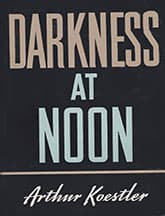Darkness at Noon
Critique • Quotes
 First edition
First editionFirst publication
1940
Literature form
Novel
Genres
Literary
Writing language
German
Author's country
England
Length
Approx. 75,000 words
No light at the end of this tunnel
Darkness at Noon was not quite what I had expected, based on what I had heard. Fans and critics had described it as presenting the ordeal of an innocent man charged during the Moscow show trials of the 1930s. Torture was decried. Political tyranny exposed. And the undaunted human spirit overcame all.
Not really. In fact, hardly at all.
Yes, it is a critique of Russian communism having betrayed its ideals. But it is not so black and white.
In the first place, the prisoner Rubashov is hardly shown as innocent. The specific charges of assassination and sabotage plots may be nonsense, but Rubashov is led to confess to them because he is guilty of deeper crimes. He has long been a cynical supporter of the system that is trying him and he has persecuted others in the same way he is now being tried.
Moreover he convinces himself his confession is his final service to the system, offering himself as a scapegoat to inspire others to stay the course. (In this I am reminded of Morley Callaghan's later novel A Time for Judas in which the disciple willingly plays his role as the betrayer in the crucifixion drama to help make Christ the saviour—a sacrifice for the greater cause. The Biblical reference of Koestler's title, Darkness at Noon, reinforces this connection.)
The torture is nearly all psychological—no waterboarding or electrodes to the genitals. Its most coercive element is logical discourse. This is a very talky novel—as you can see from the quoted notable lines—mostly comprising dialogue between Rubashov and his two interrogators, or between Rubashov and himself. It's at a very high level. None of the "confess you swine or you'll never see your family again" variety. Rather an exacting examination of Rubashov's motives and their consequences, including discussions of history and political philosophy.
Betraying the revolution
I expected it to be quite one-sided and anti-communist. But what we have here is a fight between two sides who have both betrayed the revolution in their ways. As Koestler sees it, the only possible "good side"—barely hinted at in the novel—would be an alternative to the political approach altogether. This especially comes out at the end of Darkness at Noon when the larger ocean of existence is sensed as washing over all these petty issues, perhaps heralding Koestler's later submersion in mysticism.
Koestler considers Stalinism to be only the latest manifestation of Machiavellian politics in which the ends always justify the means, in which cold reason runs amuck. In fact, he never mentions communism, the Soviet Union or Russia (called the "Country of the Revolution" or just "Over There"), nor a specific leader ("Number One" in the novel). It's clear he has in mind actual places, people and events, but the lack of specific references is intended to make the theme more universal, as though it applies more widely to human history and human psychology.
Is it successful? A lot of readers have thought so. Before reading it myself I suspected Darkness at Noon might be one of those novels whose popularity is due to a politically fashionable message rather than due to its virtues as literature. But I found that, despite its ponderous philosophizing, the novel is quite succinctly and vividly written, an involving read.
The characters are not mere mouthpieces for positions but are insightfully drawn, right down to tiny quirks. The arguments they make are subtle and persuasive on both sides, which is unsettling and makes one want to read on to see how they can be resolved. They can't, of course—perhaps illustrating Koestler's point about the futility of rational inquiry.
Darkness at Noon shares this ambivalent quality with the two other famous dystopian novels written around the same time: Huxley's Brave New World and Orwell's Nineteen Eighty-Four. They all make quite sensible arguments for positions that many are likely to find abhorrent. They reveal and disturb.
Self-deception
In the end I am not sure Darkness at Noon does succeed on a large scale. I'm not convinced it explains what went wrong with the socialist upheavals of the first half of the twentieth century, nor clarifies any great contradictions of politics and history over many centuries.
On a smaller scale though, it does incisively examine the psychology of some individuals caught up in great movements. This may be enough for now. It's a taut, brilliantly structured novel. No wonder it made for a successful play also.
One more thing: I don't know where some people get the idea the human spirit triumphs in Darkness at Noon. They seem to require an uplifting resolution, even if they have to manufacture one that does not exist in the book. Koestler might understand the need for this kind of self-deception.
— Eric
Critique • Quotes

